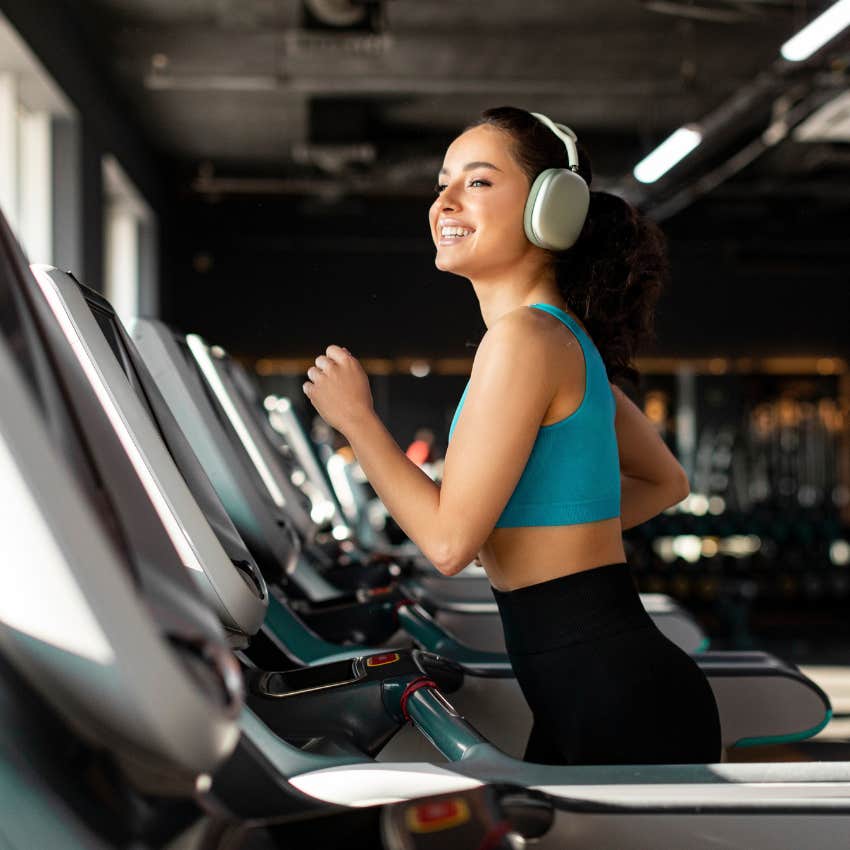People Who Exercise Regularly Literally Change Their Brains In These 5 Fascinating Ways, Says Research
Science shows that consistent movement doesn't just sculpt your body; it rewires your mind.
 Dushawn Jovic | Unsplash
Dushawn Jovic | Unsplash Going to the gym is something that we all hate to love and love to hate. Sure, you might feel great after your workout, but sometimes, it's a real dread having to get up and out of your comfy bed — especially during the cold months that we know and love as winter.
For the most part, it's essential to put not only your body's health first, but also your mental health, which is why going to the gym can be beneficial — especially if you've been feeling stressed out. It's crucial to take care of yourself and your mindset before you go downhill (which is something that I've done), so take a look below at the stress-relieving mental health benefits of exercise that can help you when your anxiety is at an all-time high:
People who exercise regularly literally change their brains in these 5 fascinating ways, says research:
1. Exercise helps to release endorphins, which makes your brain and body feel better
According to 2016 research, endorphins "can bring about feelings of euphoria and general well-being." What this means for you is that when you exercise, your brain is receiving signals saying that you're doing something healthy, which helps to place you in a better mood than you're currently in.
You don't want to feel all mopey all of the time (hopefully), so if you do things to intentionally help your body feel good, your mood will automatically improve — which, in turn, will help boost your self-esteem. The great thing about going to the gym is that you can go in feeling horrible, and you may even leave feeling sore, but mentally you'll feel a million times better.
2. Exercise brings quick relief to the tense, tight muscles you get from stress
 fast-stock / Shutterstock
fast-stock / Shutterstock
The thing is, moving around helps "reduce muscle tension, which lowers your body's overall feeling of anxiousness." Even if you're going to cycle for 20 minutes or walk on the treadmill for 15 minutes, doing something is better than doing nothing at all.
A good thing to note: it's better to build yourself up than to go hard from the beginning and end up sore for a week. If you had told me that I would've gone from cycling for a total of 10 miles in 50 minutes to completing a personal training session with a full face of makeup on, I probably would've called you a boldface liar, but both of those things did happen, and I lived to tell the tale. So start slow and work your way up to feeling comfortable in the gym.
Nothing's worse than aching and getting random muscle spasms throughout the day, so taking care of yourself by stretching and exercising can help with those achy muscles. The more tense your body is thanks to stress, the more anxious you'll be — it's a vicious cycle. So take some time to move your body so you can loosen up and relieve some of those aches and pains.
3. Exercise can help you feel less depressed
While anxiety and depression aren't the same, more often than not, they're linked together. According to The Mayo Clinic, "exercise may also help keep depression and anxiety from coming back once you're feeling better."
Again, even a little workout at the gym is better than not doing anything at all. You also don't have to go to the most expensive gym in your area to get your money's worth; there are plenty of reasonably priced gyms with locations in your area (most likely), so don't go spending thousands of dollars just yet.
While I'm not a medical expert, what I can tell you is that depression is a battle that you should never have to or want to face on your own. At least when you're at the gym, you'll be surrounded by other people. They might not talk to you, but you could always make small talk with them and become friends with one another.
Alternatively, you could always hire a personal trainer to help hold you accountable and to have someone at the gym to talk to. Either way, you're moving your body, improving your mood, and making strides toward a healthier mental state.
4. Exercise can make you sleep better
 Monster Ztudio / Shutterstock
Monster Ztudio / Shutterstock
Most likely, you're going to say that sleep will naturally happen because your workout pushed you too hard. While this might be true in some cases, exercise actually does help to promote proper sleep by creating more adenosine in the brain, which helps you fall asleep faster. According to an article by Everyday Health, a sleep study published in the journal Sleep Medicine found that people who exercised "reported getting an extra 75 minutes of sleep per night — more than any drug has helped deliver."
It's the worst when you're constantly tossing and turning at night since you're not sleeping. It also sucks to wake up in the middle of the night or suffer from insomnia and not be able to fall back asleep for hours. So luckily, working out will help to tire out your body, helping you sleep through the night like a baby.
5. Exercise helps your brain work better, so you can think straight and make better decisions
According to research from The Anxiety and Depression Association of America, the writer explains that exercise can be an effective way to help your brain work better. "Studies show that it is very effective at reducing fatigue, improving alertness and concentration, and enhancing overall cognitive function."
What this means is that you'll be able to think things through and focus more on the task at hand. Some people use prescription medications to help them concentrate when they have consistent issues doing so, but working out can help you overcome these issues naturally.
So when you can focus better by exercising regularly, ultimately you'll be able to get more done, relieving some of the stress and anxiety you've been feeling.
Liz Abere is a freelance writer who has been featured in Business Insider, Insider, MSN, and Teen Vogue, in addition to having her most popular article cited by Elite Daily.

